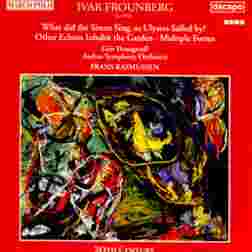
Geir Draugsvoll, accordion
Aarhus Symphony Orchestra
Frans Rasmussen, conductor
Orchestral Works
Geir Draugsvoll, accordion
Aarhus Symphony Orchestra
Frans Rasmussen, conductor
Program:
What did the Sirens Sing, as Ulysses Sailed by?
Other Echoes Inhabit the Garden
Multiple Forms
total time: 48:34
released: 1996
label: dacapo (8.22.4027)
distributed by MVD Music and Video Distribution GmbH
Oberweg 21C-Halle V
D-82008, Unterhaching
Munich
Germany
Review by Henry Doktorski:
This CD features the three major orchestral works of the Danish composer Ivar Frounberg (http://inet.uni-c.dk/~ivarfro/). He was born in 1950 in Copenhagen and originally graduated from the Royal Danish Academy of Music in 1976 as an organ soloist. As a composer, however, he was a relatively late starter; most of his works were composed from the mid-1980s onward.His late maturing as a composer can be seen as one of the reasons why he stands markedly apart from most of his contemporaries in Danish music; his composer's debut in 1986 ranks as a major breakthrough in Danish art music.
Presently, Frounberg teaches computer music at the Royal Danish Academy. His works fall mainly into two categories: computer works and works such as the three orchestra scores contained on this CD that attempt to transfer the experiences gained from computer music to the conditions of traditional ensembles.
As this column focuses on classical accordion works, we will consider Other Echoes Inhabit the Garden first.
The work begins with the note A which appears in octaves in rapid succession first in the brass and trumpets, then in the woodwinds and piccolos, and then is continued with the pizzicato strings. Soon after the accordion enters with minor seconds in the right hand and staccato left hand ostinato repetitions. The character is consistent with many electronic pieces: masses of sound (and pitch class intervals) are juxtaposed and contrasted with each other. The over-all effect is pointillistic, mysterious and fascinating. I found the piece to be very attractive and seductive, despite it's lack of melody and harmony. The accordion (and other instruments) generally sustain sounds, although as the piece progresses, more varied melodic activity presents itself.
The title Other Echoes Inhabit the Garden came from T. S. Eliot's Four Quartets and was inspired by the poem's tension between cultural awareness and unlimited experience of nature. This work, which also exists in a shorter version for accordion solo, was written for and commissioned by Geir Draugsvoll.
The other two works on the CD, What did the Sirens Sing, as Ulysses Sailed by? and Multiple Forms have the same similar musical idea: an attempt to open up the concept of musical form, so that the works we hear are no longer just one continuing narrative but contain a number of possibilities and potential combinations. The music has a beginning, middle and end, but not necessarily in that order.
The title of What did the Sirens Sing, as Ulysses Sailed by? refers to a riddle based on the twelfth book of Homer's Odyssey that the Roman emperor Tiberius is said to have thought about during idle hours: if someone heard the sirens singing, he died -- except for Ulysses, who never told anyone what he had heard. So we have no way of knowing what they actually sang, and according to Frounberg this paradox is an accurate description of how we experience music in the media world of today.
The composer deliberately makes the music ambiguous, therefore the work will never be the same twice, since several parts of it are openly structured, allowing the conductor to combine different musical elements within a certain framework. So we not only will never know what the siren's sang, they will also sing something different each time.
Draugsvoll's playing is impressive and his bellow control admirable; in addition his accordion blends quite well with the orchestra. I believe this CD will be a treasure for contemporary classical connoisseurs.
| About The Free-Reed Review |
| Invitation to Contributors / Submission Guidelines |
| Back to The Free-Reed Review Contents
Page |
| Back
to The Classical Free-Reed, Inc. Home Page |